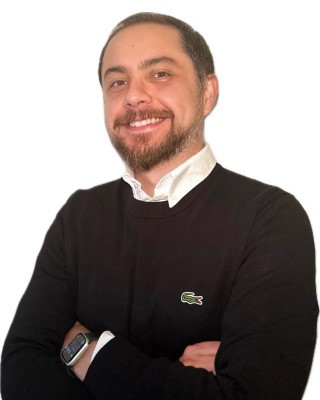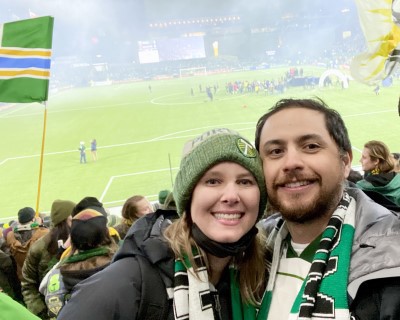Finding His Niche in the Northwest’s Hydroelectric Industry
Enrique Ochoa
Senior Engineer & Operations Project Manager, PacifiCorp

Enrique Ochoa didn’t know much about dams and hydroelectricity when he first entered the civil engineering field. But after a job transfer brought him to the Pacific Northwest, he decided to go back to school to earn a master’s degree and build his knowledge of construction engineering.
Enrique ended up selecting the University of Washington’s online Master of Science in Civil Engineering: Construction Engineering program, where he was particularly inspired by a course on energy infrastructure and the environment. What he learned there sparked an interest that would eventually lead to a whole new career path.
“I ended up doing a research paper for that course on hydroelectric power generation in Oregon, which helped me gain skills and get exposed to that industry,” Enrique says. “So when I applied to my current job, I had some knowledge about the field, even though I didn't have any actual work experience. In the interview, I actually shared my research paper with my supervisor, and I think that helped me land the role.”
Here, Enrique talks about choosing the UW, his work on hydroelectric facilities and why it’s a great time to be in the field of construction engineering.
Tell us about your current work role.

I’m a senior engineer and operations project manager for PacificCorp, which is a private power company that serves the western United States. I’m in the renewables department in the Civil Engineering and Dam Safety Group. Our group oversees the civil infrastructure and dam safety for 42 hydroelectric plants owned and operated by PacifiCorp.
In my role, I manage capital projects to rehabilitate, improve and/or expand hydroelectric facilities. This includes the embankment dams, spillway structures, gates, power tunnels, intakes, surge tanks — all of the infrastructure that helps serve the hydroelectric plant.
Why did you select UW for your master’s degree?
At the time, I lived in Vancouver, in southwest Washington. So when I was looking at graduate programs, I was intrigued that the University of Washington had a construction engineering master’s program, given the proximity to me and the prestige that UW has as an institution.
I also knew that having a UW credential could boost my career. Because my undergrad degree is from a foreign country [Mexico’s University of Colima], sometimes people are not familiar with that school or know much about it. I thought that having a master’s degree from a university here would be important for my career.
Why construction engineering?
I’d already worked on both the engineering side and the construction side of the industry, and I wanted to keep my options open to work in both fields. I found that construction engineering programs offered a good blend of engineering design and construction management, so the UW program was the best fit for me.
How did the program fit in with your life and your work schedule?
I was working full time while getting my master’s; the ability to study at my own pace and not be tied to a specific schedule allowed me to better organize myself. The fact that I was able to plan school around my work and my personal schedule — vacation plans, family events — was really helpful.
It was also key that the program was online. With a lot of in-person master’s programs, you pretty much have to do it full time, but this one was much more flexible. I typically took just one class per quarter; I doubled up during times when work was less busy.
How has what you studied in the program helped your career?

Two courses stood out to me as extremely helpful. One was the temporary structures class, which taught us how to design formwork (like the forms that hold concrete before it sets) and design scaffolding for industrial purposes. I was able to directly apply what I was learning in that course to my everyday work, including one of my favorite projects: the 2018 expansion of Providence Park, the stadium where the Portland Timbers play.
I served as the formwork engineering lead on that project, and I was responsible for the scaffolding and temporary shoring design for the project — all skills I gained through the temporary structures course. I’m a Timbers season-ticket holder, so I would go to the games with my wife and witness how my designs were keeping the structure in place while the stadium expansion was going on. I was really proud to have been part of that work.
The other important class was the one on energy infrastructure, which gave me my first exposure to the energy industry. I really enjoyed the course’s focus on renewable energy, specifically hydroelectric power. That’s one of our main sources of energy here in the Northwest.
Why is construction engineering a good field to get into right now?
It's a great time to be a civil engineer with a construction engineering background, because there's a lot of demand. There’s been a ton of investment in recent years, from both the government and private sectors, to replace and retrofit aging infrastructure.
There's also been an ongoing shift from fossil fuel energy to renewable energy; that's creating demand for civil engineers to work in this field. We’re going to need to install more wind and solar energy plants, and we need to improve hydroelectric facilities as well.
Why is it worth the time and resources required to earn a master’s degree?
You do have to make some sacrifices, but in the end I think it's well worth it because you gain valuable skills, knowledge and practical experience. You're also exposed to areas that perhaps you weren't aware of. Like in my case, I had no prior experience in the energy industry, but I learned about hydroelectricity here in the Northwest in this program and it sparked my interest. Without the master’s program I wouldn't have been exposed to that, and perhaps I wouldn't have this job.
Also, at the end of the day, credentials matter. A lot of job openings list a master’s degree as a preferred qualification. So, getting an advanced degree helps you grow professionally within your current job, and it can also open up future opportunities.
— Interview by David Hirning (May 2024)